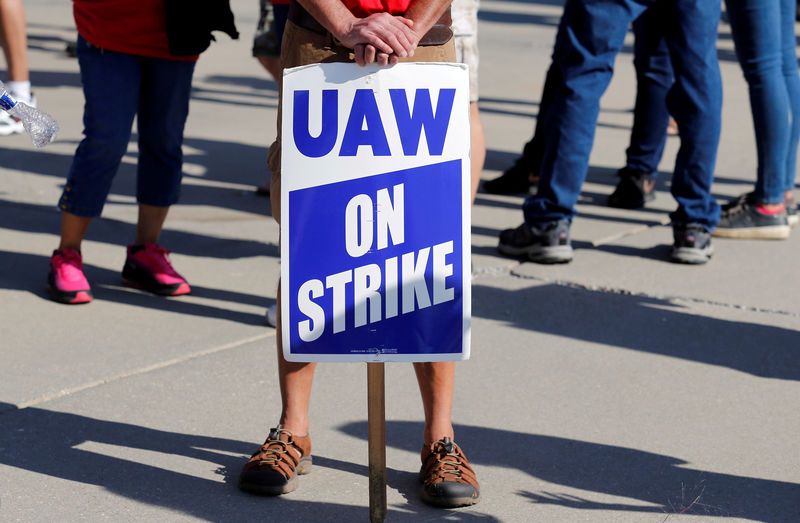By Ben Klayman
DETROIT (Reuters) - Talks for a new four-year labor contract between General Motors Co (N:GM) and its striking workers took a "turn for the worse" on Sunday after the United Auto Workers rejected the largest U.S. automaker's latest offer but the two sides were still talking.
GM made an offer to the union that basically repeated one the UAW had previously rejected, Terry Dittes, the UAW vice president in charge of the GM department, said in a letter to members. The union provided a copy of the letter to Reuters.
"These negotiations have taken a turn for the worse," he said.
"We, in this union, could not be more disappointed with General Motors," Dittes said. "The company has shown an unwillingness to fairly compensate ... the UAW."
Dittes said the UAW made an offer on Saturday to GM that covered wages, signing bonuses, job security, profit sharing and other issues. He said GM responded on Sunday morning with its counteroffer, which "did nothing to advance a whole host of issues."
GM said in a statement that it was committed to negotiating "around the clock" to reach a deal.
"We continue to negotiate in good faith with very good proposals that benefit employees today and build a stronger future for all of us," the company said in the statement.
The GM strike began on Sept. 16 with its 48,000 UAW members seeking higher pay, greater job security, a bigger share of the automaker's profit and protection of healthcare benefits. The sides have been meeting daily.
One key issue is around assembly of future vehicles. The UAW wants GM to make commitments on future products it would build in various plants beyond what has currently been offered, said a person familiar with the talks who asked not to be identified.
GM officials previously said the Detroit company's labor rates are the highest in the industry and it needs the ability to build some vehicles in other markets to keep costs down.
Just before the strike began, GM, the largest U.S. automaker by vehicle sales, said that its offer to the UAW included plans to invest more than $7 billion in its U.S. plants over the life of the deal.
GM also said then it had "solutions" for the Lordstown, Ohio, and Detroit assembly plants that it had previously said would cease making vehicles. Sources said at the time those plans included a battery plant in Ohio and building an electric truck in Detroit.
The UAW has previously said it wants GM to shift vehicle assembly work back from other countries like Mexico and China. The source said that remains an issue in the talks.
Through August, 526,000 of the 573,000 vehicles GM exported from Mexico were sent to the United States. U.S. President Donald Trump and many Democrats have urged GM to shift production to unused or underused U.S. plants.
Other issues remaining in the talks include wages and pensions, the source previously said.

Analysts estimate the strike has cost GM over $1 billion, while LMC Automotive estimated on Thursday that GM has lost production of 118,000 vehicles through Oct. 2.